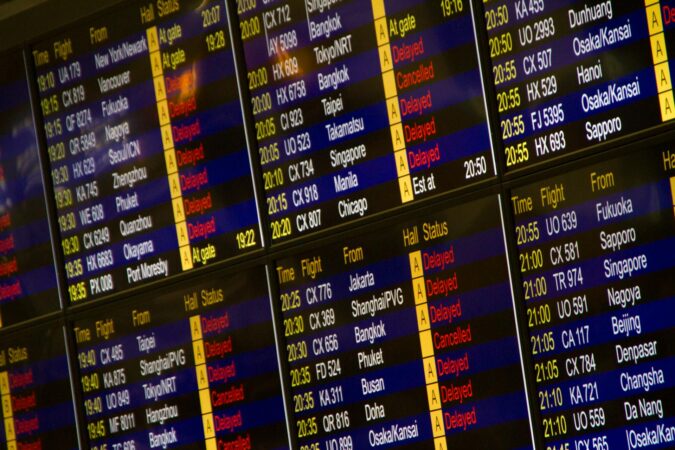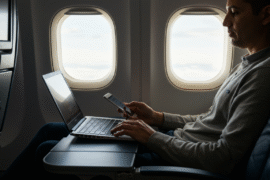This article may contain references to products or services from one or more of our advertisers or partners. We may receive compensation when you click on links to those products or services. Nonetheless, our opinions are our own.
The information presented in this article is accurate to the best of our knowledge at the time of publication. However, information is subject to change, and no guarantees are made about the continued accuracy or completeness of this content after its publication date.
Flight delays and cancellations often cause more than just inconvenience. For business travelers and financially conscious individuals, they can disrupt schedules, lead to lost revenue, or trigger additional costs such as lodging, meals, and rebooking fees. While external factors can’t always be avoided, there are effective strategies to minimize the risk and manage the outcome efficiently.
- Factors Contributing to Flight Disruptions
- Scheduling Strategies to Lower Risk
- Real-Time Information Tools
- Pre-Trip Preparation for Delay Scenarios
- Financial Strategy While at the Airport
- Passenger Rights and Financial Compensation
- Closing Thoughts
- Frequently Asked Questions
- What commonly causes flight delays and cancellations?
- How can I minimize the risk of delays affecting my financial plans?
- Which tools are best for tracking delays or cancellations?
- Is it worthwhile to purchase travel insurance?
- What should I do immediately after learning of a flight cancellation?
- Can loyalty programs help during disruptions?
- Are there credit cards that offer travel protections?
- Recommended Reads
Factors Contributing to Flight Disruptions
Several elements outside the traveler’s control can interfere with flight schedules. Knowing these ahead of time allows for more informed planning and better risk management.
| Disruption Source | Description |
|---|---|
| Weather Conditions | Fog, thunderstorms, and snowstorms can ground flights or cause significant delays. |
| Aircraft Maintenance | Mechanical issues must be resolved before takeoff, often causing last-minute changes. |
| Air Traffic Saturation | Overloaded airspace can lead to extended holding patterns and runway delays. |
| Workforce Interruptions | Strikes by ground staff or airline crew may result in partial or full operational shutdowns. |
These events can lead to significant unplanned expenditures or missed financial opportunities, especially for travelers on business-critical schedules.
Scheduling Strategies to Lower Risk
Choosing flights with fewer dependencies can improve travel reliability and reduce financial vulnerability. Consider the following when booking:
Travel During Off-Peak Periods: Mid-week departures and travel outside holiday seasons generally face fewer disruptions.
Select Early Departures: Flights scheduled for early morning have lower delay rates due to fewer preceding complications.
Opt for Nonstop Routes: Removing layovers eliminates the risk of missed connections and compounded delays.
Review Historical Punctuality: Government and third-party sources (such as the DOT’s Air Travel Consumer Report) provide on-time performance metrics for airlines and airports.
Prioritizing reliability over minimal ticket price can prevent downstream costs, particularly for high-stakes travel.
Real-Time Information Tools

Technology can reduce the financial risks associated with unpredictable flight changes. Effective use of digital tools enables faster response and greater control.
Airline Mobile Applications: Most carriers now offer apps with live updates, digital boarding passes, and rebooking options.
Independent Tracking Services: Platforms like FlightAware or FlightRadar24 allow travelers to monitor aircraft movements and receive real-time alerts.
Weather Monitoring: Watching conditions at both origin and destination airports may give early warning of disruptions.
Integrating these tools into pre-travel planning helps optimize response times if delays occur.
Voted "Best Overall Budgeting App" by Forbes and WSJ
Monarch Money helps you budget, track spending, set goals, and plan your financial future—all in one app.
Get 50% OFF your first year with code MONARCHVIP
Pre-Trip Preparation for Delay Scenarios
Travelers can mitigate financial losses and stress by preparing for contingencies in advance.
Smart Packing Practices: A compact carry-on with clothing, medications, snacks, and chargers can reduce reliance on expensive airport purchases during extended waits.
Consider Insurance Coverage: Policies that cover delays, trip interruption, or cancellations can provide reimbursement for out-of-pocket expenses.
Identify Alternate Routes: Have a list of alternative flight numbers or departure times ready in case rebooking becomes necessary.
Taking these steps in advance reduces exposure to unplanned costs and decision paralysis during a disruption.
Financial Strategy While at the Airport
What travelers do during the delay period can significantly influence the financial outcome of a disrupted itinerary.
Arrive with Margin: Arriving early reduces stress and improves flexibility in the event of schedule changes.
Use Lounge Access Wisely: Airport lounges provide Wi-Fi, refreshments, and space to work, which can be a valuable resource during long delays. Many credit cards or travel memberships include access.
Communicate Effectively: Polite, well-informed interactions with staff often produce better results when seats are limited and lines are long.
Those who travel frequently for business may also benefit from priority support lines or concierge services offered through premium credit cards or elite loyalty status.
Passenger Rights and Financial Compensation
Travelers may be eligible for reimbursement or compensation, depending on their location and circumstances. The following table outlines typical policies in major jurisdictions:
| Jurisdiction | Compensation Overview |
|---|---|
| U.S. | No federal mandate for delay compensation, though voluntary airline policies may include meals, lodging, or vouchers. |
| EU (Regulation 261/2004) | Monetary compensation for delays over 3 hours or cancellations under certain conditions. |
| Canada | Tiered compensation based on airline size and length of delay under the Air Passenger Protection Regulations. |
Travelers should document events, retain receipts, and review the airline’s contract of carriage for eligibility. Promptly submitting claims is critical.
Closing Thoughts
Travelers can’t change the things that cause flights to be late, but they can change how ready they are and how they respond. People who work in finance, are executives, or have to meet tight deadlines can lose a lot of money and time when things go wrong. A strategic approach that includes careful booking, digital tools, and financial protection measures helps keep productivity up, losses down, and peace of mind.
Frequently Asked Questions
What commonly causes flight delays and cancellations?
Typical reasons include severe weather, technical maintenance, congested airspace, and labor strikes.
How can I minimize the risk of delays affecting my financial plans?
Select early, nonstop flights during low-demand periods, and travel with carriers that have a strong on-time record.
Which tools are best for tracking delays or cancellations?
Apps like FlightRadar24 and airline-specific platforms deliver real-time updates and rebooking tools directly to your device.
Is it worthwhile to purchase travel insurance?
Yes. Insurance covering delays and interruptions can provide reimbursement for meals, hotel stays, or alternate transportation, particularly helpful on business trips.
What should I do immediately after learning of a flight cancellation?
Use the airline app or contact support directly to rebook. Avoid waiting in long lines if faster alternatives are available digitally.
Can loyalty programs help during disruptions?
Yes. Priority boarding, expedited support, and rebooking advantages often come with elite frequent flyer tiers.
Are there credit cards that offer travel protections?
Yes. Many premium cards provide compensation for trip delays, baggage issues, and lounge access during disruptions.

Reviewed and edited by Albert Fang.
See a typo or want to suggest an edit/revision to the content? Use the contact us form to provide feedback.
At FangWallet, we value editorial integrity and open collaboration in curating quality content for readers to enjoy. Much appreciated for the assist.
Did you like our article and find it insightful? We encourage sharing the article link with family and friends to benefit as well - better yet, sharing on social media. Thank you for the support! 🍉
Article Title: How to Handle Flight Delays and Cancellations Like a Pro Traveler
https://fangwallet.com/2025/08/29/how-to-handle-flight-delays-and-cancellations-like-a-pro-traveler/The FangWallet Promise
FangWallet is an editorially independent resource - founded on breaking down challenging financial concepts for anyone to understand since 2014. While we adhere to editorial integrity, note that this post may contain references to products from our partners.
The FangWallet promise is always to have your best interest in mind and be transparent and honest about the financial picture.
Become an Insider

Subscribe to get a free daily budget planner printable to help get your money on track!
Make passive money the right way. No spam.
Editorial Disclaimer: The editorial content on this page is not provided by any of the companies mentioned. The opinions expressed here are the author's alone.
The content of this website is for informational purposes only and does not represent investment advice, or an offer or solicitation to buy or sell any security, investment, or product. Investors are encouraged to do their own due diligence, and, if necessary, consult professional advising before making any investment decisions. Investing involves a high degree of risk, and financial losses may occur including the potential loss of principal.
Source Citation References:
+ Inspo
There are no additional citations or references to note for this article at this time.












































